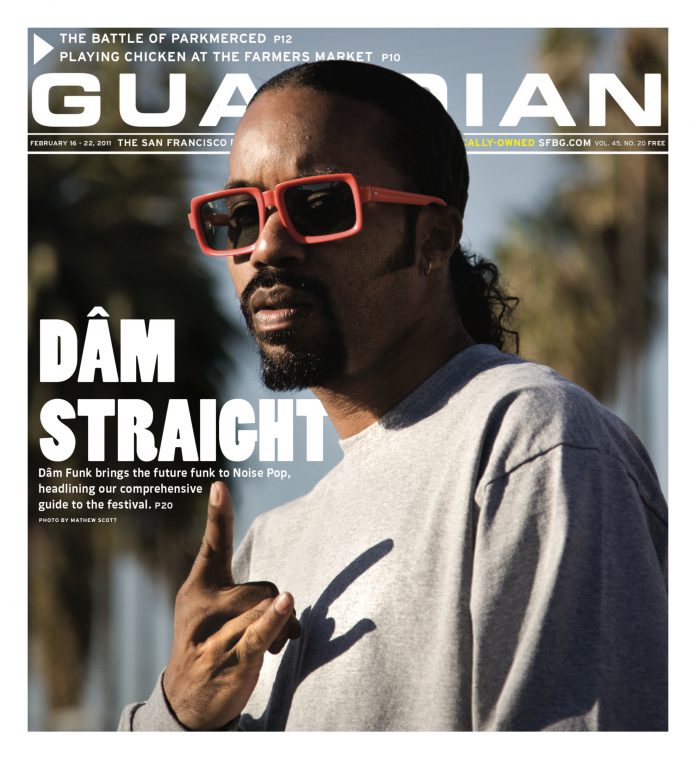Robert Moses may not know it, but he is a pied piper. The ability to hold the attention of 200 hormone-packed middle school students at 9 a.m. on a Wednesday in early February must qualify as some kind of superhuman ability.
But Moses, choreographer and artistic director of Robert Moses’ Kin, defers to his own pied piper, the one on stage who immortalized the German city of Hamelin. As the fabled character, Dexandro “D” Montalvo twitches, churns, and first commands the rats; then, with beckoning index fingers, he mesmerizes the “children” to follow him who knows where.
The Sunset District students may not have known the story of the Pied Piper of Hamelin, who was cheated out of his justly earned wages and took awesome revenge. But they surely recognized the popping moves Montalvo so skillfully threaded into his character. One way or another, the kids were hooked. For close to an hour, they sat quietly and took in what Moses and his dancers had to show them from their upcoming world premiere, Fable and Faith.
As a kid, I was terrified by the Pied Piper story. No good grades or cleverness — usually assigned to boys anyway in fairy tales — were going to get me out of this scenario. No prince was coming, and there was no happy ending. I was going to be locked in that mountain. The adults had royally messed up. My mother assured me that “it’s just a story.” Well, mom, you were wrong.
Myths, fables, and fairy tales tell us about the way the world works. “Actions”, Moses explains after the performance, “have consequences. The stories talk about life, adversity and perseverance through hard times.” He admits that some of them can be problematic. Stepmothers, for instance, get a “major bum rap.”
Perhaps that’s what initially drew Moses to last year’s The Cinderella Project, which will be performed with the new Fable and Faith before going on tour later in the spring. Cinderella Project, his first collaboration with writer/actor Anne Galjour, who also wrote and performs the text for Fable and Faith, was informed by interviews with contemporary constructed families rooted in love, not blood. “Still, tough as it was,” Moses notes, “Cinderella stuck to who she was and it turned out alright.”
In the 1950s, there was a move underfoot to clean up some of these old tales; the thinking was that children’s psyches would be damaged by so much darkness and uncertainty. Fortunately, the stories have survived, though it’s good to know that Rapunzel no longer gets locked up in the tower because she was pregnant — it was just the evil deed of a jealous witch.
Moses takes a common sense, “age-appropriate” approach when he reads to his own two children, ages five and three. It was this fatherly task of sharing an imaginary world — everything from Dr. Seuss and the Brothers Grimm to African American folktales and Greek mythology — that got him to think about the contemporary resonance of some of these once-upon-a-time tales.
“Think of it,” he says. “Children are being abducted. Or today we talk about ‘the wolf at the door.’ ” In Fable and Faith, the wolf (Montalvo) goes to see a psychiatrist (Katherine Wells) to find out why he is behaving the way he does. The back-and-forth exchange in words and movement ends on a note of real poignancy.
Formally, Moses and Galjour decided on a structure “in which stories clash into each other.” The setting, they felt, had to be a village. “It’s where life happens,” Moses says. Elaine Buckholtz, who started lighting with Contraband and who has become a magician of visual installation, will do the honors on Fable and Faith. To keep a child’s presence at the forefront of these adult dances, Moses is partnering with the San Francisco Boys Chorus. They will perform, among other selections, the “Lacrimosa” from Mozart’s Requiem.
As the students were leaving for their classes, a teacher turned to me and whispered, “We have been very lucky this morning.”
FABLE AND FAITH
Fri.18-Sun./20, 2 p.m.; $25–$35
Yerba Buena Center for the Arts, Novellus Theater
701 Mission, SF
(415) 978-2700

